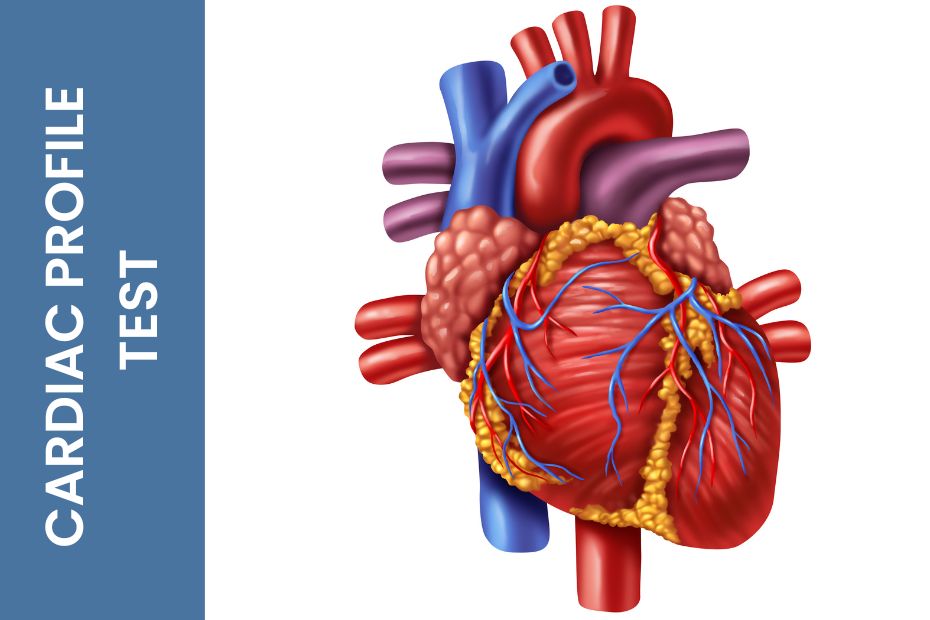Good cardiovascular health is fundamental to a long, healthy life. A healthy heart is a happy heart. Therefore, regular heart health checkups are essential for a better quality of life. This can help prevent any new problems from coming up and control existing heart problems. A cardiac profile is a screening tool for cardiac and other vascular diseases. The cardiac profile or cardiac panel can also estimate your risk of a cardiovascular event in the future, such as a heart attack, stroke, and so on.
When should I do a complete cardiac profile checkup?
If a cardiac profile is not covered in your regular battery of tests in an annual health checkup, it should be. It is a good idea to get a separate cardiac profile once a year, especially after 40 years of age. You can also do a cardiac profile if you experience any of the following symptoms:
1. Chest pain
2. Breathlessness and Inactivity
3. Face turning Blue
4. Swelling in both legs
5. Swelling on the face
6. Heart palpitations
7. Loss of consciousness
8. Fatigue
9. Tiredness
10.Visible veins on the chest
These symptoms require urgent attention by a qualified cardiologist and regular heart health checkups.
What does a cardiac profile consist of?
A cardiac profile consists of a variety of blood tests and other investigations that can help screen the body for any heart diseases or the risk of a heart attack in the future. It checks the level of all relevant heart markers, such as hormones, enzymes, and proteins. They all increase in concentration in the blood in cases of cardiac events.
It consists of a bundle of blood tests, as follows:
1. Lipid Profile:This blood test checks the level of fats in the blood, which can be of different types with different properties and functions. The common fats mentioned under the lipid profile are as follows:
a. Low-Density lipoprotein: It is a lipid molecule that is freely circulating in the blood, and an increase in its levels is detrimental to the health of the blood vessels and can lead to blocking and narrowing of the same. Therefore, LDL is often termed “bad cholesterol.
b. High-Density Lipoprotein: it is a type of lipid that is a healthy fat in the body and helps with cholesterol regulation through a feedback mechanism.
c.Total cholesterol is the animal fat that, in humans, is associated with an increased risk of heart disease or other vascular accidents, especially with levels above 200 mg/dl.
d.Triglycerides: these are free fatty acids in the blood that also cause oxidative stress and damage to the inner lining of vessels and cause what is known as atherosclerosis.
- CKMB, creatinine kinase muscle, and brain are proteins that are used to evaluate for heart attack or damage to the heart muscle. It is a biomarker for heart attack and increases a few hours after a heart attack.
3. High-sensitivity Troponin:Troponin is a highly specific and sensitive biomarker for heart attack and is elevated within a few hours of HF. It is very commonly used now in settings of acute cardiac events. It helps rule out heart attacks in people with chest pain.
4. Brain Natriuretic Peptide Test: The brain natriuretic peptide is a protein that regulates the blood sodium and water levels and total fluid levels in the body. Elevated BNP in the blood indicates dysfunction of the cardiac muscles, like heart failure and carcinogenic shock.
5. CRP (C-reactive protein): It is an inflammatory marker produced in the liver that is elevated during infections and when the body is in an inflammatory state. It has predictive value for heart diseases and heart attacks. The higher the level of C-reactive protein, the higher the risk of cardiovascular events.
What are the Benefits of a Cardiac Profile?
A cardiac profile or cardiac panel helps to screen an individual for the possibility of heart disease. It also has several other benefits, such as the following:
1. Timely detection of cardiac risk factors and diseases such as high cholesterol levels, abnormal heart rhythms, heart failure, and so on. Early detection of diseases leads to proper intervention within a safe window for work.
2. A cardiac profile gives a complete assessment of a person’s risk for future cardiac events by estimating levels of cardiac markers such as age, BMI, gender, addiction, and family history.
3. Monitoring of already existing heart conditions to see if treatment is helping and to make a personalised treatment plan that is best suited to the patient
4. Encouragement to live a healthier and better lifestyle, which includes lots of vegetables, fruits, and cardiovascular exercises.
5. Reduced expenditure on healthcare with advanced and early cardiac care and precautions
How to maintain good Cardiovascular Health?
Cardiovascular health is an important determinant of longevity and good health. It can be improved at any age or medical condition. Following are some key factors that are important for the maintenance and enhancement of cardiovascular health:
1. Good sleep of at least 7-9 hours in all age groups to give the body time to recover
2. Heart-friendly food, such as servings of vegetables and fruits during the day.
3. Healthy fats such as omega-3 fatty acids and cod liver oil
4. Avoid the consumption of smoking and alcohol.
5. Take a walk outdoors and exercise frequently.
6. Spend time with loved ones and do things you love.
7. Lower stress levels by practicing meditation, laughter therapy, and participating in community activities.
8. Get regular cardiac checkups along with an overall health review.
9. If you have lifestyle diseases like diabetes, hypertension, obesity, and such, kindly make sure to manage and keep the condition under control.
10. Lower cholesterol levels with lifestyle changes and take medications if necessary.
11. Maintain a healthy weight and waist.

